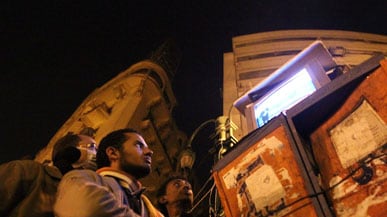As I write, a ticker flashes across my screen reporting that our Cairo bureau has been stormed, our offices closed, and our equipment confiscated. It’s another hurdle in a fast-growing list of obstacles to prevent Al Jazeera’s groundbreaking coverage in Egypt, where we have more reporters, cameras, and citizens’ feeds on the ground than any other international network.
On Thursday, three of our journalists were arrested. The next morning one of our websites was hacked. All week the Egyptian government-owned satellite company Nilesat blocked our broadcast signal.
Undeterred, our teams fanned out across the country. Braving the same violent attacks waged by pro-government loyalists against the demonstrators, Al Jazeera journalists fired up their cameras in Cairo, Suez, Alexandria, and Malhalla to capture the dramatic scenes of hundreds of thousands of everyday Egyptians struggling for greater representation. In parallel, scores of citizens armed with mobile phones, Twitter, and Facebook fed us real-time images and updates from the street. Social-media platforms have become an integral part of our coverage. The regime’s response? They turned the Internet off.
ADVERTISEMENT
There’s no doubt about intent: Cairo wants to deny our ability to inform the world of the remarkable events as they unfold in Egypt. Crossing governments set out to monopolize information across the Arab world—that is hardly new to Al Jazeera. But at this particular moment, I question whether this, in effect, is what has also happened to Al Jazeera English in America. There too, we are almost completely shut out.
That’s quite worrying, as the U.S. media market rests on sturdy democratic principles, namely the First Amendment and the freedom of expression. But ever since Al Jazeera’s English channel first sought to broadcast in the States, roadblocks have marked every turn.
In the late 1990s, Al Jazeera’s Arabic channel emerged as a transformational force in the Middle East. It gave a platform to the “Arab street”: Intellectuals and marginalized political opposition were heard, in many cases, for the first time. A free press may be a familiar fact in the West, but where I live the concept of an independent news channel was truly revolutionary.
Not long after, the Bush administration was intent in promoting democracy across the Middle East. But as it waged wars in Iraq and Afghanistan, it also cautiously tried to manage the flow of information to the American people. Accordingly, Washington’s “with us or against us” mentality, regrettably, extended to the media. Al Jazeera was quickly demonized for daring to provide alternative viewpoints on wars that had, to put it bluntly, been sanitized for American audiences. Already famous in the Middle East for telling both sides of the story, Al Jazeera decided it was not about to comprise its professional standards. We would not ignore the human realities of war on the ground.

What stunned us then, as it does today, was the insistence by U.S. operators that Americans were not interested. From a commercial standpoint, they argued, we weren’t worth their precious bandwidth.
In recent days, our online viewership spiked by 2,500 percent. And over 50 percent of that viewership has come from the U.S.!
Our figures prove otherwise. In recent days, our online viewership spiked by 2,500 percent. And over 50 percent of that viewership has come from the U.S.!
For the Egypt story, people around the world turned to Al Jazeera, as they had many times before, because they wanted uncensored, professional, and straight-up reporting. We are unique because our reporters understand the social, political, and historical fabric of the societies they cover. They speak the language. They know the terrain. This makes our news distinct. It makes it journalism with depth. So it’s mindboggling that Al Jazeera remains absent on cable and satellite television across almost all of the U.S.
But in the end, the truth finds a way. Ironically like the people on the streets of Egypt, Tunisia, Lebanon, and Sudan, the people of America, too, have been defying limits. They’ve adapted, watching our livestreams online, our YouTube channel, and spreading our headlines virally across social media. A new age of journalism has dawned, and are succeeding by empowering a new generation of reporters to thrive in it. It’s a wonder the West’s most powerful country doesn’t want to watch.
Khanfar is director general of the Doha-based Al Jazeera Network.






